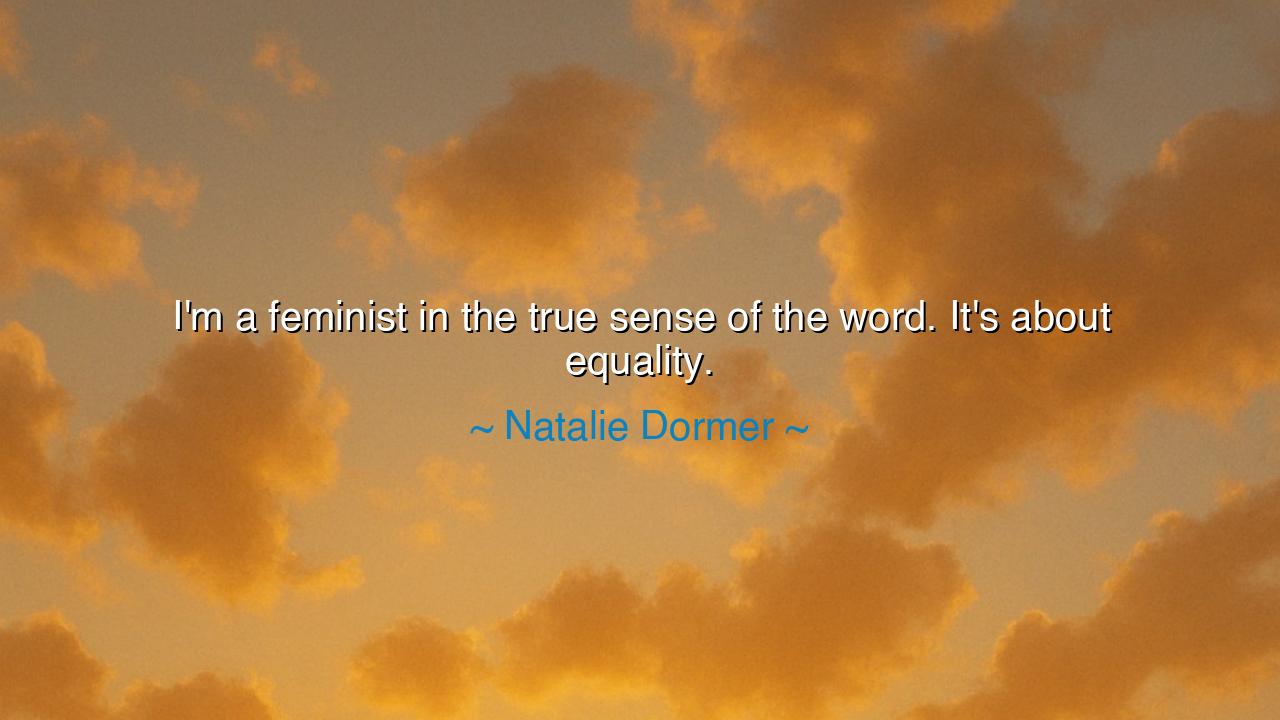
I'm a feminist in the true sense of the word. It's about






“I’m a feminist in the true sense of the word. It’s about equality.” Thus declared Natalie Dormer, actress and thinker, whose words ring not as a slogan but as a restoration of truth. For in an age when the word feminism has been twisted, debated, and misunderstood, her statement returns it to its purest form—the pursuit of equality, neither dominion nor vengeance, but balance and justice between the sexes. In this brief utterance lies both humility and strength: the recognition that feminism is not a war cry, but a call to harmony, a reminder that the dignity of one is bound to the dignity of all.
The origin of feminism, in its truest and oldest sense, lies not in anger but in awakening. It began as a light cast upon the shadowed corners of human history, where women’s voices had been silenced and their power dismissed. To be a feminist, as Dormer says, is not to elevate women above men, but to lift both to their rightful height. Equality is the heart of the matter—the belief that no soul should kneel where another stands. True feminism is the natural child of justice, not the rival of masculinity but its companion, urging both man and woman toward their best selves.
Dormer’s words recall the wisdom of the ancients, who spoke of balance in all things. In the temples of Egypt, the goddess Ma’at represented truth and equilibrium; her feather weighed the hearts of men and kings alike. In her measure, there was no bias, no hierarchy—only the law of balance. So too does true feminism seek not to tip the scales, but to set them right. When Dormer says, “It’s about equality,” she echoes that ancient law, reminding us that to honor one half of humanity while diminishing the other is to disrupt the harmony of the whole.
Consider the story of Emmeline Pankhurst, the English suffragette whose courage shook the very foundations of empire. She fought not to conquer men, but to claim the right of women to stand beside them. Her battle cry, “Deeds, not words,” was not born of bitterness but of faith—that the promise of democracy must extend to all. Though she was imprisoned, mocked, and vilified, she persisted until the world began to awaken. Her struggle embodies Dormer’s truth: that feminism, in its true sense, is the quest for equality, a vision in which both woman and man are liberated from the chains of injustice and ignorance.
Dormer’s words also speak to the misunderstanding that often clouds this noble cause. Many mistake feminism for hostility, imagining it as a revolt against men. But such is the distortion of the shallow mind. The true feminist, like Dormer, seeks not division but reconciliation. She fights for the right of every voice to be heard, for the worth of every labor to be recognized. Her strength lies not in opposition but in inclusion. To be a feminist, in truth, is to see the divine in every form of life—to know that humanity cannot flourish when half its strength is shackled.
But the task of equality is not yet done. Across the world, there remain those who fear the word feminism, as if it were a threat to order rather than its fulfillment. Yet order built upon subjugation is no order at all—it is stagnation disguised as peace. True order, like true love, is founded upon respect. When Dormer reclaims the word “feminist” with pride and clarity, she calls upon all to lay aside fear and misunderstanding, to embrace the balance that nature itself teaches. For the earth thrives not through dominance, but through the harmony of its opposites—the sun and the moon, the tide and the shore, the feminine and the masculine.
So, my listener, take this teaching to heart: to be a feminist in the true sense is to be a guardian of balance. Stand not merely for women, but for justice wherever it is denied. Defend not one side of humanity, but the whole. Speak truth, as Dormer does, with grace and conviction; let your understanding of equality be the measure of your strength. In your home, in your work, in your speech, honor the dignity of all.
For when men and women walk together as equals, not as rivals, the world itself is healed. The music of civilization regains its lost harmony, and the chains that bind both sexes fall away. This is the true sense of feminism—not rebellion, but restoration; not hatred, but hope. Let it be said, then, that equality is the flame by which we light the path forward, and that those who carry it, like Natalie Dormer, carry not only a word, but a vision of justice made whole.






AAdministratorAdministrator
Welcome, honored guests. Please leave a comment, we will respond soon